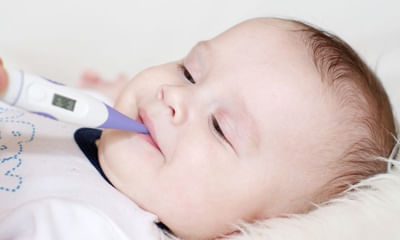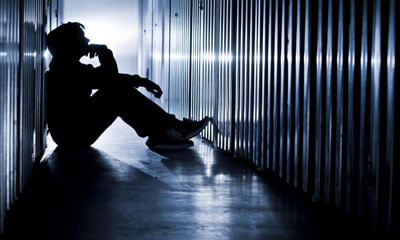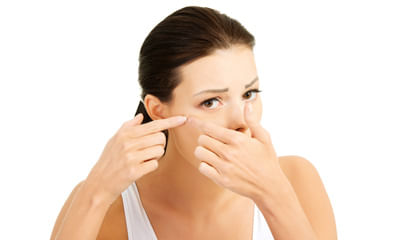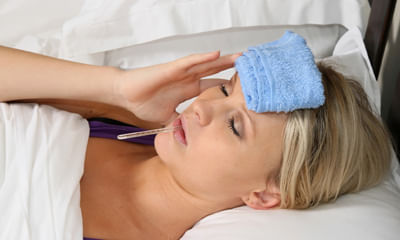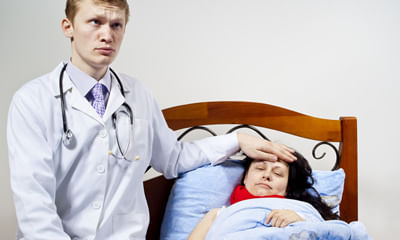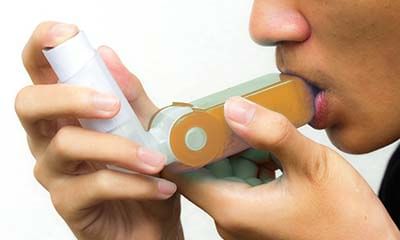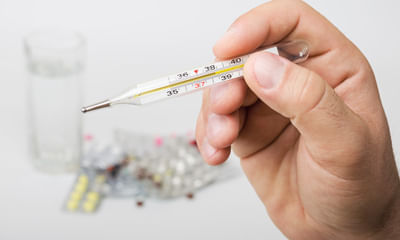Headache And Vomiting In Adults
My baby is 1 year 3 months old. Yesterday night I gave her noworm oral suspension 5 ml. Today she is feeling drowsy and ...
Ask Free Question
Dear parents, each and every drug has side effects, but the intensity of side effects varies with person to person. Usually albendazole is very safe drug and it is essential to kill worms in your baby's gut and prevent worm infestation (so government applied deworming campaign using albendazole biannually for 1 to 5 year child). It is possible that dizziness and vomiting could be due to albendazole or could be due to other cause, but this drug is generally very safe and no or minimal side effect occurs. But if today your baby is fine, then it is ok. No need to worry. It will remain transiently, and if your baby has still problem then consult a pediatrician.
Doctor I am 38 (f) I am going under a lot of stress these days due to my office. For the past few months I have noticed ...
Ask Free Question
Usually self-diagnosable Migraine headaches can cause throbbing in one particular area that can vary in intensity. Nausea and sensitivity to light and sound are also common symptoms. People may experience: Pain areas: in the eyes, face, or neck Pain types: can be dull Headache: can be acute, frequent, or throbbing Visual: sensitivity to light, distorted vision, or seeing flashes of light Whole body: dizziness, light-headedness, or malaise Sensory: aura or sensitivity to sound Gastrointestinal: nausea or vomiting Also common: irritability, nasal congestion, or scalp tenderness
Hi I have pimples, dermatologist I consult in online told me to take minoz er 65, it is helpful to treat pimples or not? ...
Ask Free Question
treatment depends on the grade...Acne or pimples... Due to hormonal changes..Oily skin causes it...Common in adolescent age...May occur in adults also.. Food like Oily foods, ice cream, chocolate and sweets increase it.. Treatment depends on the grade of pimples or acne..So, please send photos by direct online consultation as it's a must to see which grade of pimples or acne for accurate diagnosis and treatment.
Hello Dr. I am suffering from yellowish vomiting along with pain in abdominal region area and headache and fever and not ...
Ask Free Question
High bilirubin levels usually means that there may be an underlying problem involving the red blood cells, liver, or gallbladder Anemia Viral hepatitis. Treatment for elevated bilirubin in adults depends on the underlying problems, so you need cbc, usg abdomen, liver function test etc to know exact causes of increasing of bilirubin on the basis of symptoms can say it may be jaundice, but confirm with given above test.
What is the symptoms of Dengue fever. We have a doubt. My friend is really scared. Please tell. ...
Ask Free Question
Symptoms of Dengue Fever Symptoms, which usually begin four to six days after infection and last for up to 10 days, may include Sudden, high fever Severe headaches Pain behind the eyes Severe joint and muscle pain Fatigue Nausea Vomiting Skin rash, which appears two to five days after the onset of fever Mild bleeding (such a nose bleed, bleeding gums, or easy bruising) Sometimes, symptoms are mild and can be mistaken for those of the flu or another viral infection. Younger children and people who have never had the infection before tend to have milder cases than older children and adults. However, serious problems can develop.
What medications are best for the treatment of asthma? What are their side effects? ...
Ask Free Question
LABA and ICS combination by inhalation with spacer. Can cause side effect of steroid, which are rare if given under medical supervision. can cause osteoporosis, diabetes, hypertension in adults and stunted growth in childrens
Hello, I am the kind of person who eats 5- 6 times meals in a day however from past 4-5 days ,I am not feeling much hung ...
Ask Free Question
Hello, thank you for informing me about your problem, Overview Fatigue is a constant state of tiredness, even when youâve gotten your usual amount of sleep. This symptom develops over time and causes a drop in your physical, emotional, and psychological energy levels. Youâre also more likely to feel unmotivated to participate in or do activities you normally enjoy. Some other signs of fatigue include feeling: physically weaker than usual tired, despite rest as though you have less stamina or endurance than normal mentally tired and moody Loss of appetite means you donât have the same desire to eat as you used to. Signs of decreased appetite include not wanting to eat, unintentional weight loss, and not feeling hungry. The idea of eating food may make you feel nauseous, as if you might vomit after eating. Long-term loss of appetite is also known as anorexia, which can have a medical or psychological cause. It may be a warning sign from your body when you feel fatigue and loss of appetite together. Read on to see what conditions may cause these symptoms. What causes fatigue and loss of appetite? Fatigue and loss of appetite are symptoms of several health conditions. The condition can be as common as the flu or a sign of something more serious like cancer. Often a loss of appetite can cause fatigue, especially if you arenât getting enough calories or nutrients. Chronic, or long-term, pain can also interfere with your appetite and cause fatigue. Some conditions that can cause continuous pain include: fibromyalgia migraines nerve damage postural orthostatic tachycardia syndrome (POTS) pain after surgery Other causes of fatigue and loss of appetite include: chronic fatigue syndrome pregnancy flu and common cold postpartum depression heat emergencies premenstrual syndrome (PMS) alcohol withdrawal syndrome Medications You may also feel more tired than usual when your body is fighting off infection. Certain medications have side effects like nausea and drowsiness. These side effects can decrease your appetite and cause fatigue. Medications that are known to cause these symptoms include: sleeping pills antibiotics blood pressure medications diuretics anabolic steroids codeine morphine Psychological These disorders can affect your appetite and energy level: stress grief bipolar disorder anorexia bulimia anxiety depression Fatigue and loss of appetite in children You should bring your child to a doctor if they are feeling fatigued and have a decreased appetite. These symptoms can develop more quickly in children than adults. Potential causes include: depression or anxiety acute appendicitis cancer anemia lupus constipation intestinal worms Other causes include: slowed growth rate having recently taken antibiotics not getting enough rest not eating a balanced diet Fatigue and loss of appetite in older adults Fatigue and decreased appetite in older adults are both common occurrences. Some studies suggest increased age as a risk factor for fatigue. Common causes of these symptoms in older adults include: heart disease hypothyroidism rheumatoid arthritis chronic lung disease or COPD depression cancer neurological disorders, like multiple sclerosis or Parkinsonâs disease sleep disorders hormone changes Related conditions Other health conditions and symptoms that accompany fatigue and loss of appetite include: anemia Addisonâs disease cirrhosis, or liver damage congestive heart failure HIV/AIDS gastroparesis celiac disease kidney disease Crohnâs disease heumatoid arthritis chemotherapy When to seek medical help Get immediate medical help if youâre experiencing fatigue and loss of appetite along with: confusion dizziness blurred vision an irregular or racing heartbeat chest pain shortness of breath fainting sudden weight loss difficulty tolerating cold temperatures You also should make an appointment to see your doctor if youâre experiencing these symptoms after taking a new medication, even after youâve taken it for several days. Seek emergency attention if you or someone you know has thoughts of harming themselves. How will your doctor diagnose fatigue and loss of appetite? While there isnât a specific test for fatigue and loss of appetite, your doctor will review your medical history, perform a physical exam, and ask about your other symptoms. This will help narrow down potential causes so that your doctor can order the right tests. After asking questions about your health, they may order: â¢blood tests to search for potential conditions, like hypothyroidism, celiac disease, or HIV CT scan or ultrasound scan of the stomach an EKG or stress test for suspected cardiac involvement gastric emptying test, which can diagnose delayed gastric emptying How do you treat fatigue and loss of appetite? Your doctor will prescribe treatments and therapies depending on your underlying condition. Pain relief may help ease the symptoms. If medication is the cause of your fatigue and loss of appetite, your doctor may adjust your dosage or swap the medication. Treating fatigue may include learning how to increase energy in your daily life. This can mean: getting more exercise creating a schedule for activity and rest talk therapy learning about self-care Treating loss of appetite may include formulating a flexible meal schedule and incorporating favorite foods into meals. Studies also show that enhancing the taste and smell of foods can increase appetite in older adults. They found that adding sauces and seasonings resulted in a 10 percent increase in calorie consumption. Other methods used to treat fatigue or loss of appetite include: appetite stimulants like Marinol low-dose corticosteroids to increase appetite sleeping pills to help you sleep better at night physical therapy to slowly increase exercise antidepressants or antianxiety medications, for depression or anxiety anti-nausea medications like Zofran for nausea caused by medical treatments Counseling or participating in a support group may also help reduce depression and anxiety-related causes of fatigue and loss of appetite. How can I prevent or treat fatigue and loss of appetite at home? Your doctor or dietitian can offer suggestions for improving your appetite and reducing fatigue. For example, you may need to change your diet to include more high-calorie, protein-rich foods, and fewer sugary or empty calorie options. Taking your food in liquid form such as green smoothies or protein drinks may be easier on your stomach. If you have trouble with big meals, you can also try eating small meals throughout the day to help keep food down. While fatigue and loss of appetite canât always be prevented, living a healthy lifestyle can minimize lifestyle-related causes of fatigue and appetite loss. You may feel less fatigued and have more energy if you eat a balanced diet of fruits, vegetables, and lean meats, exercise regularly, and sleep for at least seven hours each night. Feel free to get connected and clarify your queries in the private section. Wish you best of health!
Hi Sir, My brother has typhoid igg positive. He has stomach pain slightly and headache vomiting and joint pain. Suggest ...
Ask Free Question
MR MONISANKAR YOU HAVE NOT MENTIONED THE AGE , PERIOD OF PROBLEM AND TREATMENT TAKEN PRESUMING ADULT AND NEW PATINT YOU ARE ADVISED TO TAKE FOLLOWING MEASURES 1. TAKE LIGHT MEAL 2. DRINK BOOLED COOL WATER AND TAKE LIQUID DIET PREFERABLY 3. CIPROBID 500 MG 2 TIMES DAILY FOR 2Q DAYS 4. ÇOBADEX 1 CAP DAILY AFTER LUNCH
Hi Sir, What are the symptoms of dengue fever? Explain about children and adults. Please help me on it. ...
Ask Free Question
Hi, Severe breaking pain in bone and joints as if someone has been beaten by stick. Reddish or purpuric rashes on the body, fleeting/shifting joint pain associated with swelling may occur. High temperature of 103 to 105 degrees F. May occur which gets subsided and may relapse again within three to four days. For more info call us or take the appointment.
Is Budesonide Inhalation harmful? Actually I have been using Digihaler FB400 for three months. I intend to know whether ...
Ask Free Question
Budesonide is used to prevent difficulty breathing, chest tightness, wheezing, and coughing caused by asthma. Budesonide powder for oral inhalation is used in adults and children 6 years of age and older. Budesonide suspension (liquid) for oral inhalation is used in children 12 months to 8 years of age. Budesonide belongs to a class of medications called corticosteroids. It works by decreasing swelling and irritation in the airways to allow for easier breathing. Every medication has some amount of Side Effects associated with it and it is only a small number of people in which a few Side Effects are seen. If you think you are having Side Effects then you need to talk to your doctor but just to mention the list of Side Effects associated with this medications are as follows Budesonide inhalation may cause side effects. Tell your doctor if any of these symptoms are severe or do not go away: headache stuffy or runny nose sore throat diarrhea loss of appetite stomach pain difficulty falling asleep or staying asleep neck or back pain ear infections nosebleeds Some side effects can be serious. If you experience any of the following symptoms or those in the SPECIAL PRECAUTIONS section, call your doctor immediately or get emergency medical treatment: white spots or sores in your mouth rash hives itching swelling of the face, throat, tongue, lips, eyes, hands, feet, ankles, or lower legs hoarseness difficulty breathing or swallowing wheezing cough chest pain anxiety fever, chills, or other signs of infection tiredness nausea vomiting weakness changes in vision.

